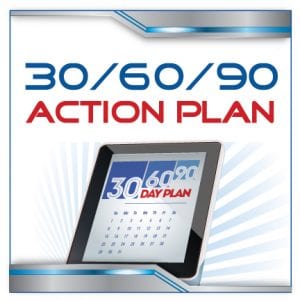To really shine in the interview, you want to blow the hiring manager away with your focus, energy, initiative and dedication right from the start. The 30/60/90-day plan is the way to do that. But what should be in a 90-day plan for job interviews? In this article, I’ll give you 3 examples for the sales, management, and technical arenas.
For most jobs, the first 30 days of your plan primarily focuses on training–learning the company systems, products, and customers. Usually, the next 30 days (the 60-day part) focus more on getting rolling, which means less training and more activity. Often, the last 30 days (the 90-day part) are the “getting settled” part. Because of that, this section should include things that take more initiative, such as handling projects on your own or going after new business.
Here are just a few examples of how this looks in 3 different areas…sales, management-level jobs, and technical jobs.
What Should Be In a 90-Day Plan
Sales
30 days –
- Study and learn the product
- Meet and establish relationships with the sales team
- Learn company CRM software
60 days –
- Continue calling upon accounts and prospect within territory, completing 2-3 call cycles before month’s end. Make sure all Anchor, Core & Developmental accounts have been visited.
- Schedule first speaker/dinner program.
- Fine tune most efficient driving route through territory.
90 days –
- Continue calling upon accounts and prospects within territory, completing 3-5 cycles before month’s end.
- Schedule 2-3 speaker/dinner programs.
- Brainstorm new & creative ways to get prospects’ attention in the field and ask your manager’s input.
Management
30 days –
- Attend company training
- Learn company policies and procedures
- Do a SWOT Analysis to inform strategic planning
60 days –
- Visit other departments to determine tasks/ relationships
- Take note of shipment, product issues
- Study Best Practices within industry
90 days –
- Begin Team Development practices
- Use 80/20 Rule to evaluate staff performance
- Establish short- and long-term goals
Technical
30 Days –
- Learn as much as possible through company training and self-education about corporate policies, company culture, equipment and techniques.
- Complete all company applications.
- Establish relationships with assistants / support departments.
60 Days –
- Use the 80/20 Rule to evaluate time and/or task management.
- Meet with supervisor for feedback.
- Set goals for next 30 days.
90 Days –
- Offer to take on special projects.
- Study Best Practices within industry.
- Work with supervisor to set long-term goals.
These examples are just a drop in the bucket of what goes in a good plan.
 Get proven 30-60-90-day plan templates here:
Get proven 30-60-90-day plan templates here:
